LAUNCHED! F2R-CWANA Offers the World a Head Start in Climate Adaptation

The Initiative capitalizes on climate-smart innovation, biodiversity, and natural resources from a diverse range of ecosystems within the most climate-impacted region in the world.
Developed in close consultation with country partners to optimize their knowledge, and target their demands and needs, F2R-CWANA delivers partners the full OneCGIAR range of expertise, networks, and assets, and aims to address regional and country-specific agri-food challenges, as well as offer the globe a head start in climate-smart agri-food systems.
CGIAR is taking major steps to boost research-for-development in climate-smart agri-food systems across Central and West Asia and North Africa through the launches in Morocco, Uzbekistan, Egypt, Sudan, and Lebanon of the partner-led CGIAR F2R-CWANA Initiative.
F2R-CWANA is a CGIAR Regional Integrated Initiative (RII) and one of CGIAR’s new global portfolio of 32 Initiatives developed in consultation with country partners to deliver more relevant, consistent, and efficient research outcomes through evidence-based innovation tailored to demand-driven country needs and respond to growing climate needs.
The new CGIAR portfolio is a result of the One CGIAR transformation that strengthens the collaboration of CGIAR’s global research centres and its partners to improve knowledge and asset sharing and reduce institutional boundaries. F2R CWANA optimizes the key expertise of eight CGIAR Centers alongside the knowledge, agricultural assets, and specialities of the partner countries involved.
The CWANA region, one of the most climate-vulnerable in the world, already faces severe water scarcity, rainfall variability, increased temperatures, drought and land degradation, along with a range of added challenges such as desertification and increased soil salinity, high population growth and migration, weak governance, conflict and fragility, widespread poverty, malnutrition, gender inequality, and high youth unemployment.
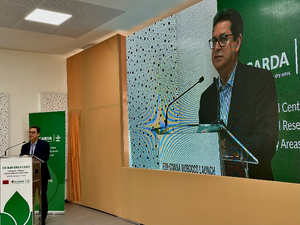
“What we see in North Africa today is a clear indication of what is to come globally tomorrow. CGIAR’s new Portfolio offers the world a head start in climate adaptation."
CGIAR CWANA Regional Director and ICARDA’s Director General Aly Abousabaa during the launch of F2R-CWANA in Morocco on May 17th.
The historic work of partner countries to address these issues means the region also offers vast opportunities in food systems climate adaptation through its abundant and climate-resilient biodiversity. Including both plants and animals, an array of renewable energy options, and food systems science and innovation, these domestic technologies already target many of the complex and interconnected challenges that can be scaled for global use.
The F2R-CWANA Initiative works closely with countries to unlock and build on current initiatives, to develop key solutions that integrate with the region’s diverse range of agro-ecosystems - rainfed, irrigated, agro-pastoral and desert farming. Key innovative approaches will produce more food with less water, introduce new climate-resistant staple crop varieties, build networks that connect vertical and horizontal levels of markets, and increase agricultural and business access to women and youth.
F2R-CWANA will also fast-track technology innovation breakthroughs in water and soil productivity and accelerate the adoption of innovative information technology, artificial intelligence, integrated pest management, and digital extension services.
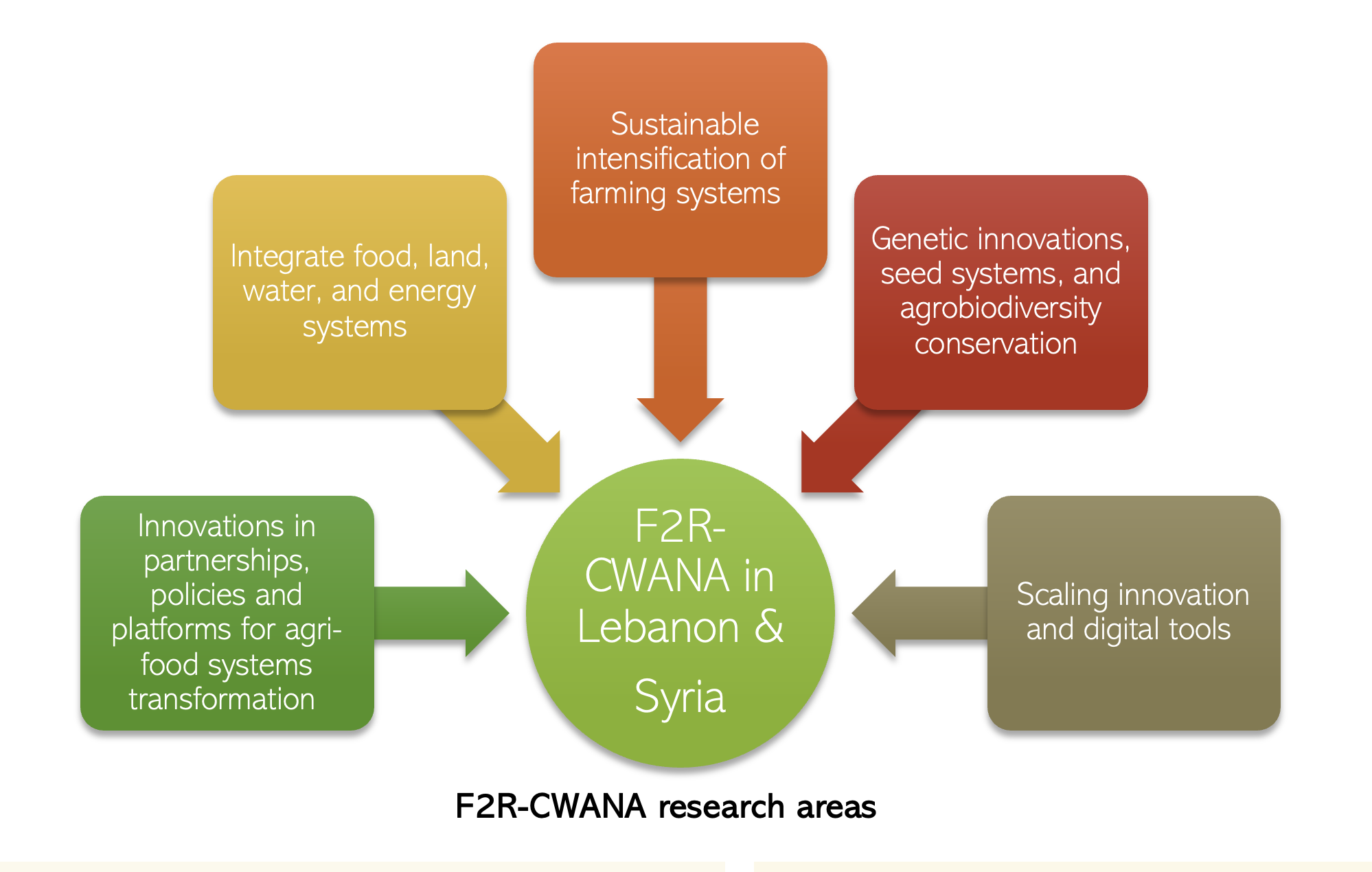
Partner countries offer unique opportunities
The F2R-CWANA initiative launched in five regional ‘anchor’ countries – Egypt, Lebanon, Morocco, Uzbekistan, and Sudan, each representing a diversity of needs and social contexts. Turkey and Syria, both member countries of the CGIAR, will also participate in this initiative with their own funding.
Yet even with the serious challenges they face, partner countries offer unique opportunities for developing globally relevant climate-smart food systems knowledge sharing and research within each of their unique environments.
Sudan, for example, offers a high-heat and arid research hub for crop innovation within its ultra-dry lowlands but faces challenges in terms of youth unemployment, gender equality, and a predominance of non-specialized smallholding.
Egypt offers one of the highest irrigated-agriculture production rates in world. But faced with crippling water shortages, the country is keen to fully develop its fledgling science in water re-use, and land reclamation – a unique research opportunity.
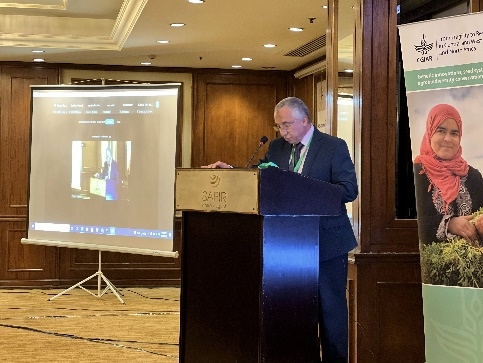
“Drought is the largest threat to food security in the developing world. Nature-based solutions, resilient food and feed crops, and farm-to-basin smart tools for water efficiency and management are just some of the many innovations that will be deployed and out-scaled in Egypt and Sudan as part of this partner led CGIAR Initiative.”
Dr. Mohamed Soliman, Director Egypt’s ARC at the Egypt launch – July <Date>
Lebanon, meanwhile, is already on track to develop better policies for increased production and improved value chains for small farmers and is one of CGIAR’s main genebank and crop research hubs. Alongside CGIAR, it also currently works to support a high number of displaced people and farmers from neighbouring countries, all under a deeply challenging economic environment, further exacerbated by the COVID19 pandemic.
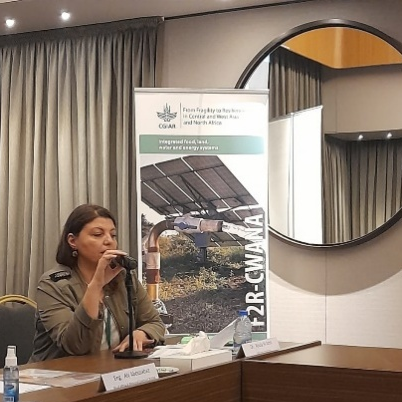
“Our food system, already under pressure from climate change, was dramatically affected by COVID19. The F2R-CWANA Initiative is set to encounter the challenges we face"
Dr. Rula Amil from the Lebanese Agriculture Research Institute during the Lebanon launch <date>.
In Syria, CGIAR has been involved for some time in researching and developing post-conflict rehabilitation of seed systems under the climate crisis, as well as building the vital foundations of extension services through ongoing capacity development programs. The outcomes can be highly relevant to other post-conflict countries regionally and globally.
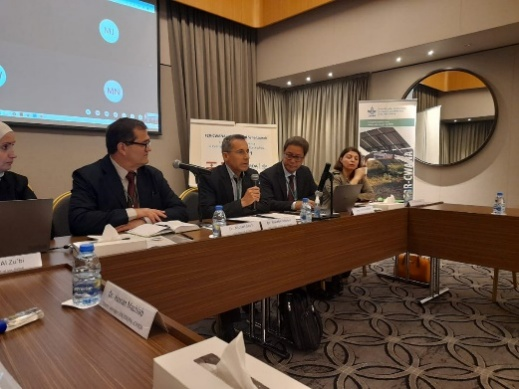
“Over the last three decades, ICARDA has provided strong results for communities in the region in better crops and capacity development. Today we discuss Syria's needs and how through the CGIAR F2R Initiative we can work together to further strengthen our food system"
Representative. of Syria, and ICARDA Board Member Dr. Mouwafak Jbour.
Uzbekistan, known for its rich biodiversity, faces a high rate of desertification, soil salination, and degradation. The country is therefore important for its groundbreaking research and development surrounding the conservation of soil, ecology, and water resources.
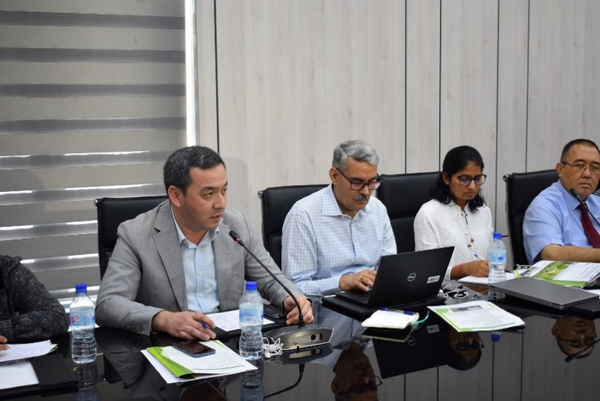
"The Uzbekistan ministry is keen on new collaborations on food systems resilience, so we welcome and stand ready to work with CGIAR partners."
Mr. Gairat Ganiev, Head of Agriculture, Knowledge & Innovation Systems, Ministry of Agriculture Tashkent at the Uzbekistan launch <date>
Morocco, another important CGIAR research hub, hosts one of two locations of ICARDA’s Genebank being housed now in recently opened new genebank facilities, and for some time has been an important global research centre for improvement of regional crops. Having recently faced one of its worst droughts in history, the country also offers much in the way of innovation in sustainable water-use and conservation agriculture, and the government is soundly behind food systems development through groundbreaking strategies such as its Green Morocco Plan and recent ‘One Million Hectares of Conservation Agriculture’ announcement.
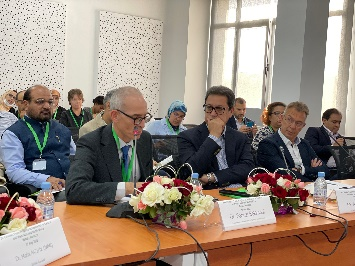
“We need 50% more cereal yields for food security in Morocco, via better soil health, organic farming and digital agriculture – components that INRA Maroc, ICARDA and CGIAR built into the F2R-CWANA initiative.” - Faouzi Bekkaoui, Director General of INRA-Maroc at the Morocco launch <date>
Targeted Support
In its first three-year phase, F2R-CWANA aims to support:
-
Government, civil society, private sector and international non-governmental organizations to create efficient, inclusive and resilient national agri-food systems.
-
Better access for farmers to best-bet genetic innovations developed for the region.
-
Capacity building so farmers can adopt best practices related to on-farm conservation of agrobiodiversity.
-
Government, civil society and private sector in scaling up bundled solutions to bridge yield gaps.
-
Government, civil society and private sector to practice integrated management of food, land, water and energy systems.
-
Government, civil society and private sector to scale up innovations and digital tools for food value chain climate risk management.
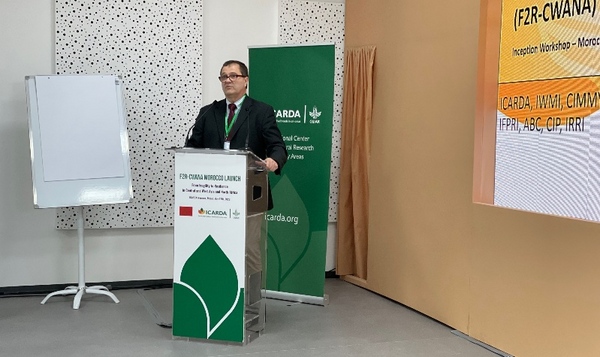
OUTCOMES
A unifying element throughout the launches is how all partner countries feature intensive, sustainable climate-smart food systems highly in their country strategies and are keen to develop policies more favorable to market access, inclusivity for women and youth, renewable energy, reduction of food imports, and the protection of biodiversity. These needs and market demands built into the F2R-CWANA Initiative through close collaboration with the countries ensured it was warmly welcomed.
Discussion and outcomes included:
-
Discussed strategic knowledge management products and identified with partners the capacity-building programs that can contribute to the innovation and impact objectives of the countries it operates. Agreement on the 2022 action plan at country level
-
Identification of key partners (demand, innovation, scaling) in each country
-
Detailed discussion that revealed key knowledge on priorities such as scalable, innovative technology and establishment of innovation platforms
-
Discussion on strategic knowledge management products and
-
identification of capacity-building programs that contribute to the innovation and impact objectives within countries
-
Identify Potential Innovation platforms in the 5 countries and discuss with partners
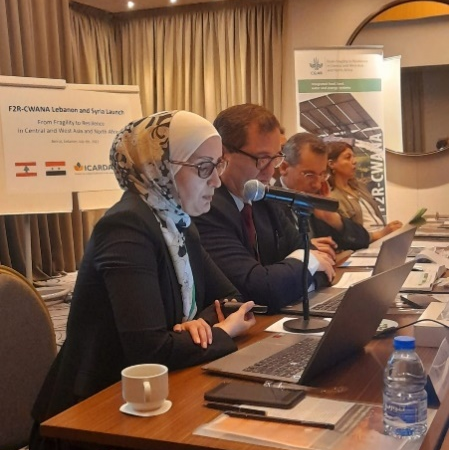
NEXT STEPS:
All country partners agreed on the overall goals and structure of the Integrated F2R-CWANA Initiative and will continue working alongside CGIAR Centers over the coming months to enact:
-
Follow-up with county level partners to initiate/launch implementation of the agreed actions and interventions
-
Identification of potential Innovation Platform in the 5 countries and discussion on their development and establishment
-
Establishment of the National Alliance of Stakeholders
-
Identification and unlocking of regional and international funding for the Initiative


